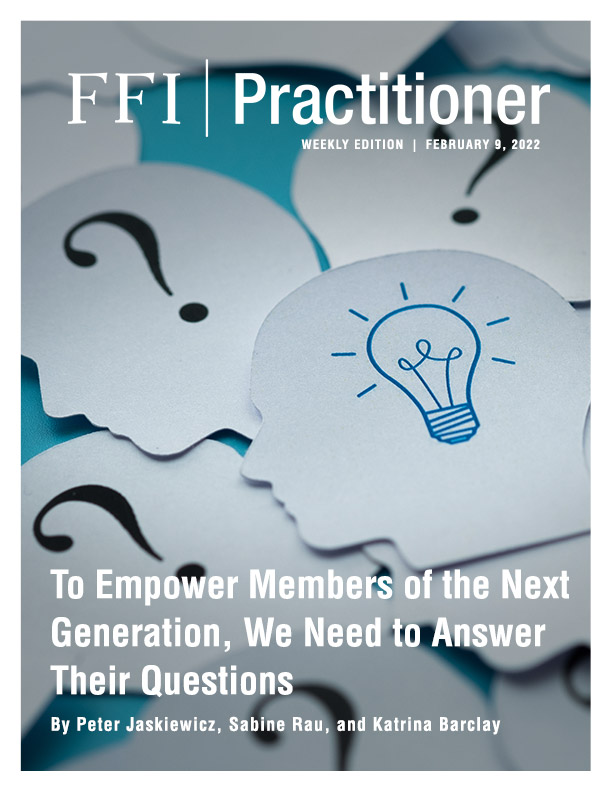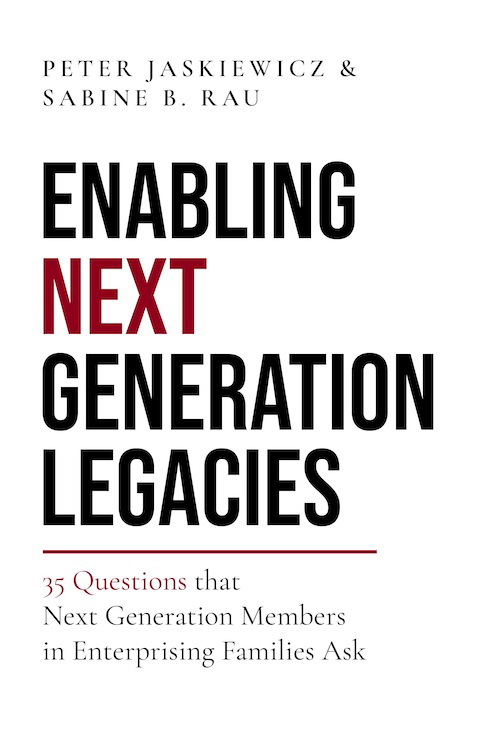
Listening to the Next Generation
Too often, great efforts are put into having the right answers, rather than asking the right questions. More onus is placed on asserting views or directing situations to desired outcomes, rather than trying to understand what the other side needs. This misunderstanding is often apparent in the dynamics between senior generations and next generations in enterprising families. A lack of understanding frequently prevails between the wishes of the senior generation and the needs and concerns of next generation members. If Next Gens find their values and goals not aligning with the enterprising family, the transition from one generation to the next becomes harder to realise—or indeed, it does not happen at all.
Unfortunately, research and advising has typically focused on the senior generation because it is the one in power. This made the researchers wonder: what do Next Gens need and want? To consider the Next Gen perspective more actively, we went straight to the source, asking Next Gens for their views, perspectives, and concerns about their involvement in their enterprising families. The result was a list of the thirty-five most pressing questions faced by Next Gen members around the world, with leading academics and enterprising families responding to each question.1
The Next Gens’ Most Pressing Questions
Our research process began with formal and informal interviews with the senior and next-generation members of more than 100 families and continued over several years. We quickly realized that the challenges and questions raised by Next Gens differed from those expressed by Senior Gens. Realizing there was a need to consider the Next Gens’ perspective more actively, we systematically collected the questions they posed. We then asked another seventy next-generation members for feedback, which eventually led to the list of thirty-five questions.
Many of the questions raised were to be expected, such as the perennial question among enterprising families, “Who is considered part of the family?” and the question familiar to any new entrant to the family business, “How can I gain credibility with nonfamily executives and board members?” Although some of the chosen questions were not complete surprises, many confirmed our pre-existing perceptions about a lack of critical conversations between Senior and Next Gen members, such as “My parents do not talk about their retirement. How can I start the ‘What’s next after you retire from the business’ conversation with my parents?” Other questions pointed to an undercurrent of concern and anxiety, such as, “Do I deserve the business and/or wealth I will inherit?” With such thoughts weighing on the minds of Next Gens, it was easy to imagine the retreat of many away from the family enterprise if their concerns are not surfaced and addressed.
Sidebar
In this book, leading academics, practitioners, and enterprising families come together to answer pressing questions of Next Generation members in a short and concise responses. To empower Next Generation legacies, the authors share best practices, real-life examples, and critical questions for reflection.
As we began to sort through the questions and to envision a framework to organize them, we used the Three Circle Model framework developed by Renato Tagiuri and John Davis.2 However, some of the questions that Next Gens brought to our attention did not fit into the Three Circle Model. Their questions concerned how to deal with the family office, how to engage with the family’s philanthropy, when to engage consultants, or how to find a new role after exiting the business. These exceptions led to our decision to add another circle—wealth—and a new role: the nonfamily member. The figure “The 35 Most Pressing Questions Next Gens Ask” illustrates our model and highlights the thirty-five questions that Next Gens asked about the family, ownership, business, and wealth systems.
What Next Gens’ Questions Had in Common
As we sorted the thirty-five questions into the different systems of family, ownership, wealth, and business, we noticed the questions would often span two or more of these systems. Such overlap further emphasized the complexity of the issues surrounding Next Gens as they navigated how to assume different roles in different systems, e.g., trusted representative in the family, responsible owner, steward of wealth, and leader of the business, and how to reconcile the often-conflicting norms of each. Indeed, Next Gens asked for help on managing the growing complexity of the four inter-related systems because they too often received expert advice in one system that did not consider the consequences in the other systems.
Figure: The 35 Most Pressing Questions Next Gens Ask
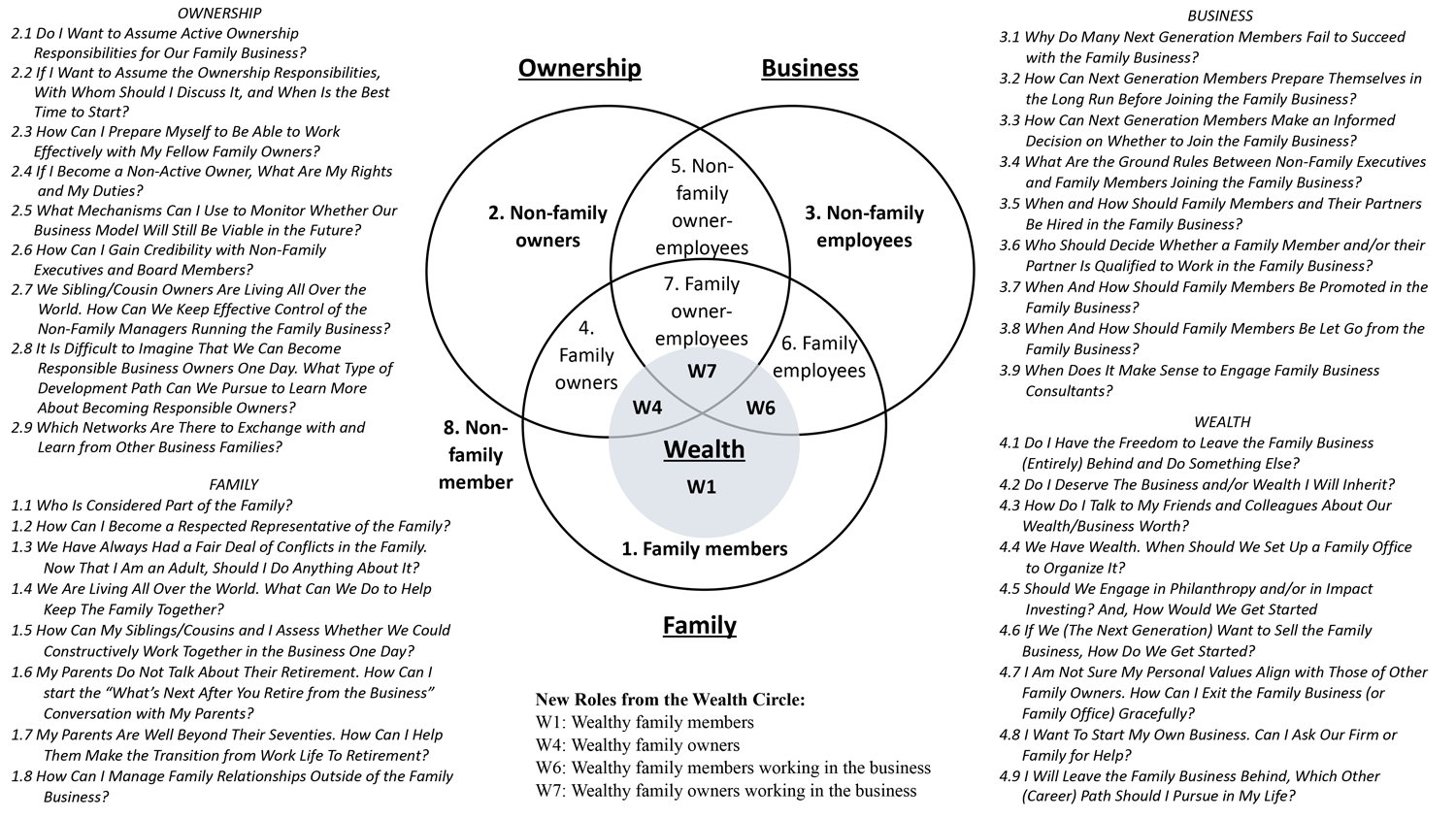
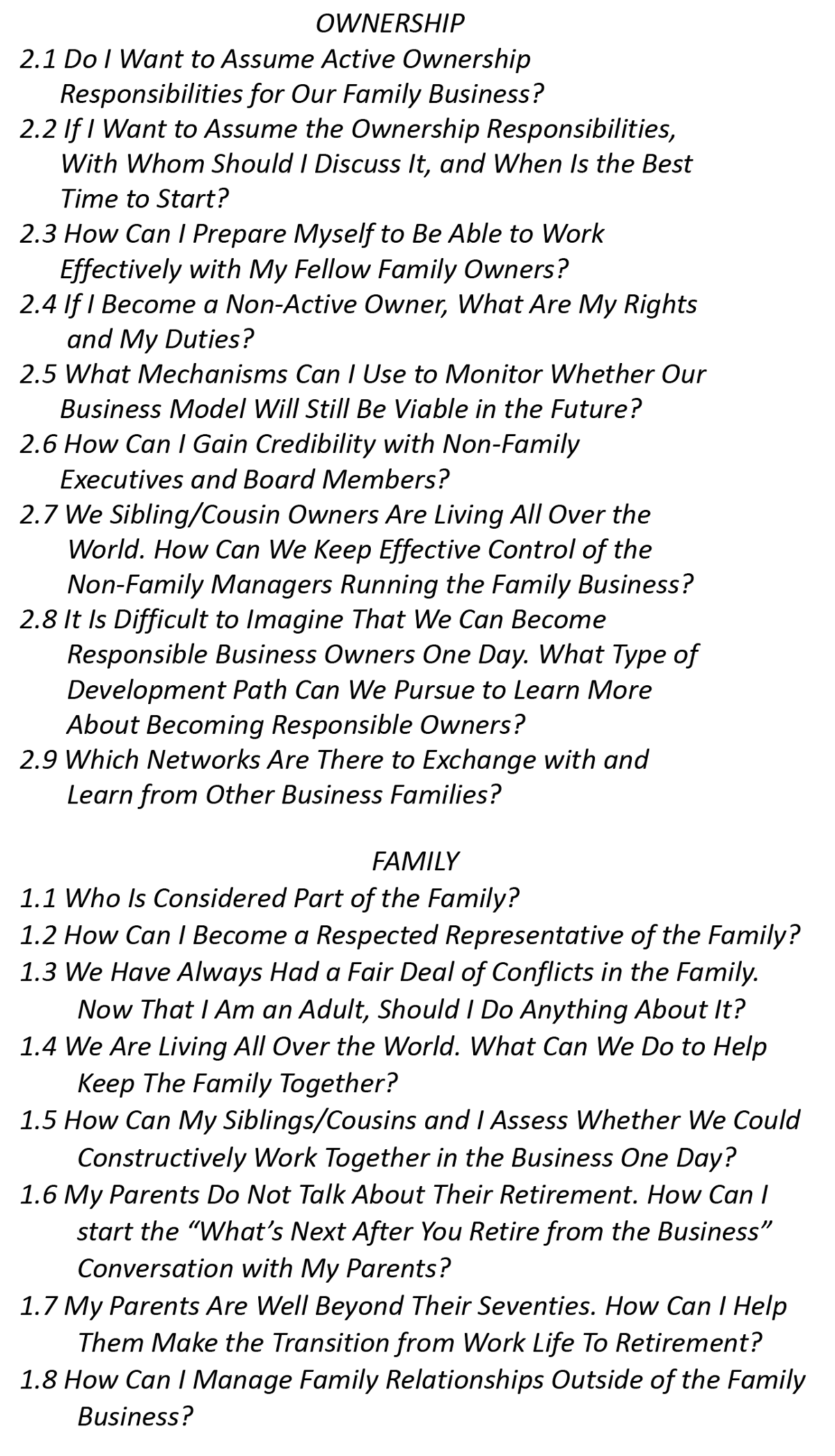
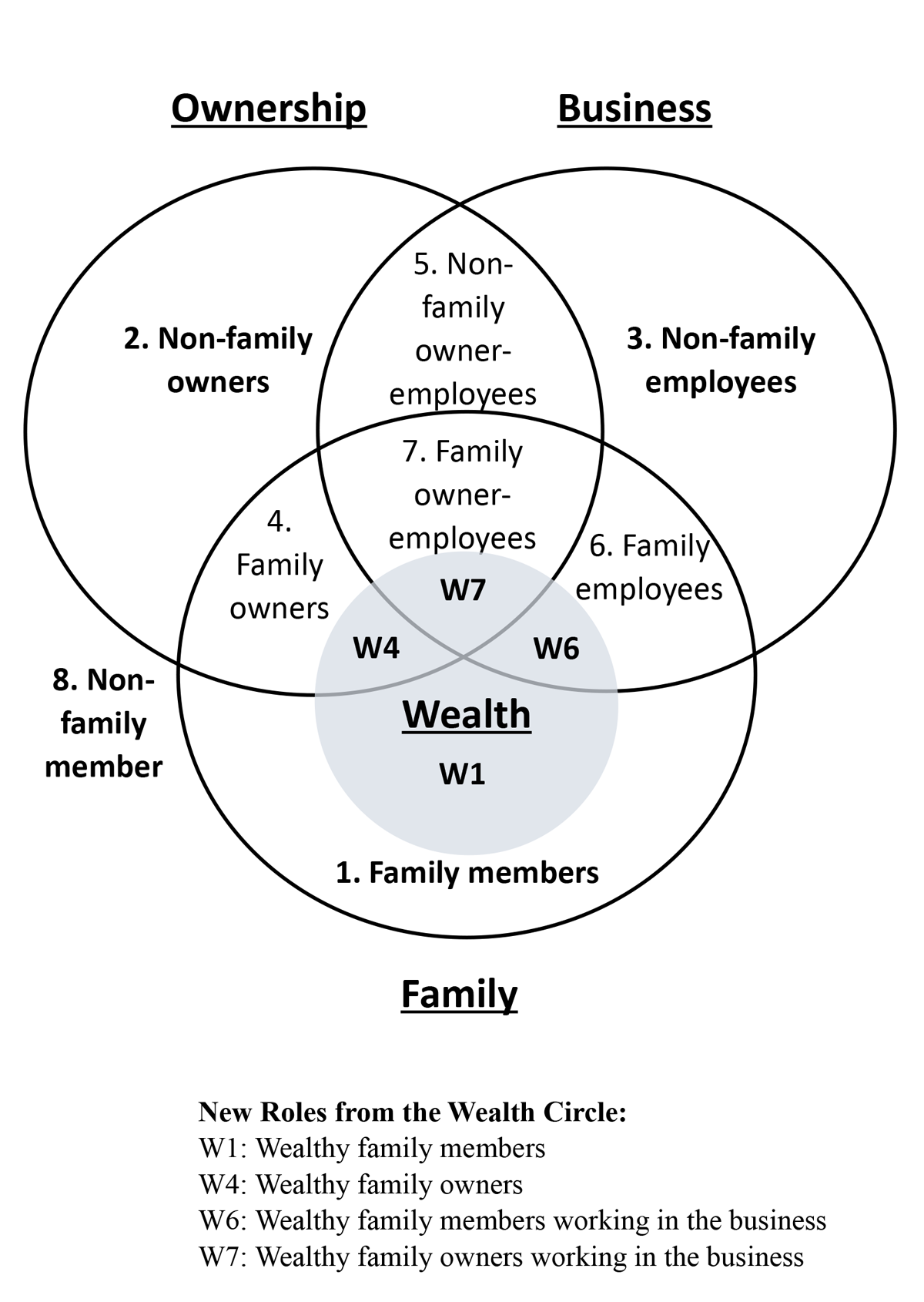
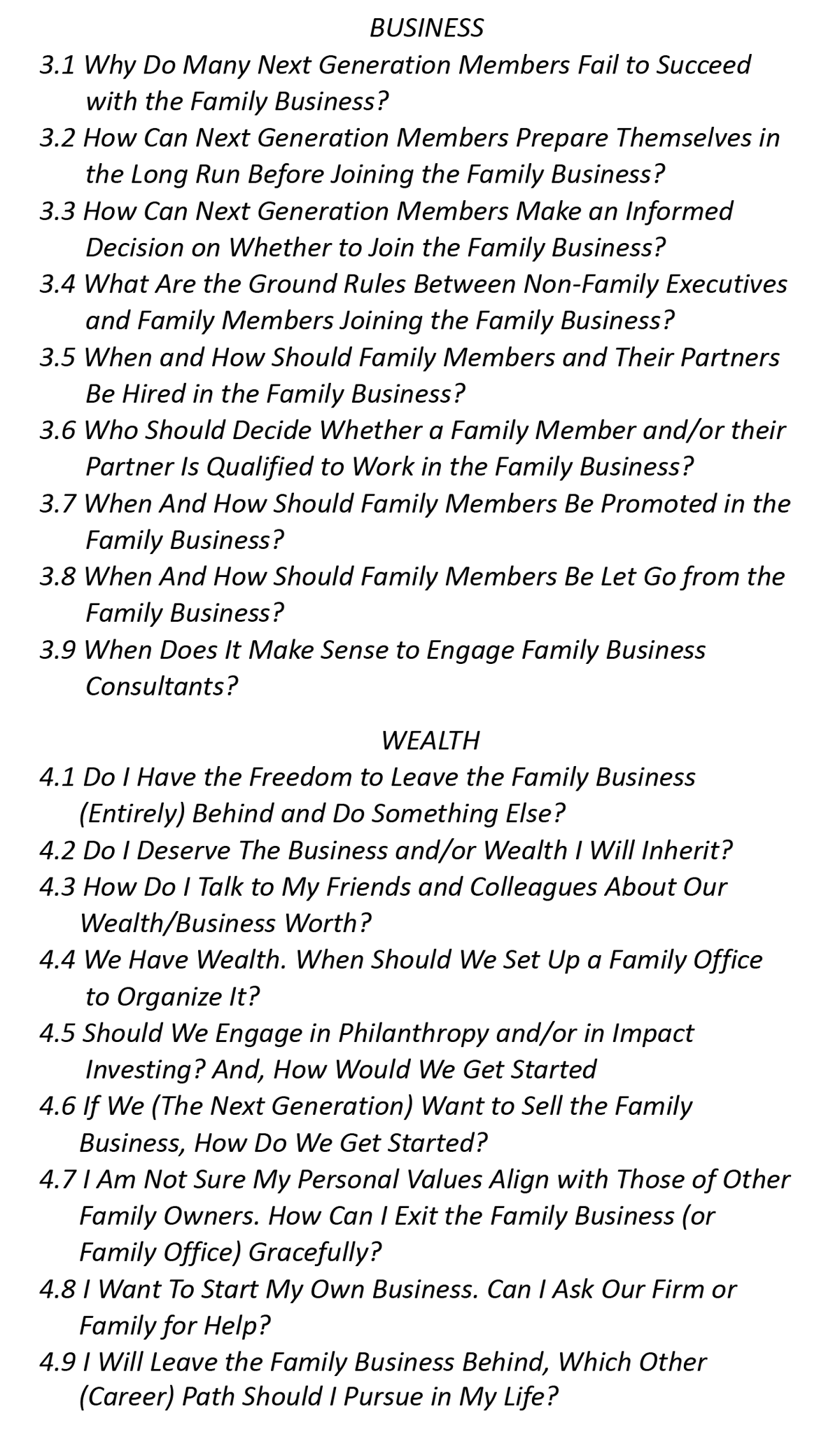
Providing the Answers
Equipped with our selected questions, we asked Next Gens what kind of guidance would be the most useful to suit their needs. They suggested avoiding academic language, responding succinctly, and making sure each chapter could be read as a contained, modular unit. They also recommended consulting with leading academics and practitioners as well as Next Gens for their responses. We looked for experts who were as familiar with academic methods as they were with life as a practitioner. After we received their replies, we went back to prominent enterprising families for commentaries. The result was thirty-five questions with thirty-five responses from leading academics and practitioners and thirty-five commentaries from members of enterprising families, bringing together the global community to answer the next generation’s call.
Starting Necessary Discussions Around Kitchen and Boardroom Tables
The next generation is often stigmatized as a potential burden that leads to the downfall of the family enterprise. But our interactions with Next Gens in more than thirty countries have given us a different impression: Next Gens have grown up in a VUCA (Volatile, Uncertain, Complex, Ambiguous) world. They are at home globally, technologically astute, and eager to learn how to address the complexity in the enterprising families they observe. While they might get ample support navigating each of the four systems, they find little help in navigating across them, and too few people are listening to their concerns and answering their questions.
It is our sincere hope that the collective effort that went into gathering these key questions, responses, and commentary will empower Next Gens to make a difference as family members, owners, employees, stewards of family wealth, community builders, and societal leaders. The time will come to hand over the power and resources to Next Gens. Posing the right questions–that is, the ones that Next Gens themselves are asking–and working through the answers with Next Gens is the best way to help them build their own legacies.
References
1Jaskiewicz, P., & Rau, S. (2022). Enabling Next Generation Legacies: 35 Questions that Next Generation Members in Enterprising Families Ask. Family Enterprise Knowledge Hub Publishing.
2Tagiuri, R., & Davis, J. (1996). Bivalent Attributes of the Family Firm. Family Business Review, 9(2), 199–208. https://doi.org/10.1111/j.1741-6248.1996.00199.x

Peter Jaskiewicz, FFI Fellow, is a full professor of family business at the Telfer School of Management in Ottawa, where he holds a University Research Chair and is the Academic Director of the Family Enterprise Legacy Institute. Peter was born into a business family and researched family business during both his doctoral studies at the European Business School in Oestrich-Winkel. Peter is an associate editor of the Family Business Review, and his research findings have been published in the Wall Street Journal, Harvard Business Review, and other leading academic and practitioner journals. In his advising practice, he trains family enterprise advisors on succession planning and helps prepare the next generation of responsible owners and effective next generation teams. He can be reached at peter.jas@uottawa.ca.
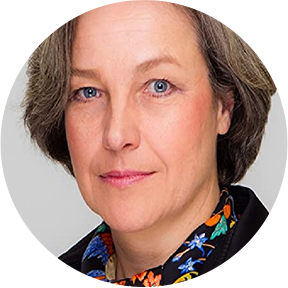
Sabine Rau is well known for moderating succession processes and co-creating family protocols in Germany and abroad. She holds visiting professorships at the Telfer School of Management (University of Ottawa) and at the European School of Management and Technology (ESMT) in Berlin, and teaches at the Université de Luxembourg. Until the beginning of 2017, Sabine was a Full Professor of Entrepreneurship at King’s College London. Before she started her academic career, Dr. Rau founded her own business and worked in her family’s business. She now serves on several boards as an independent director. Sabine can be reached at sabine.rau@forstgut-hundscheid.de.

Katrina Barclay is Communications Manager at the Family Enterprise Legacy Institute (FELI) at the Telfer School of Management, University of Ottawa. Before becoming involved in family business study and advising, Katrina founded and ran her own business for 10 years, working closely with several family firms on a national and international level. Prior to this, Katrina worked in media and communications for such organizations as the CBC and BBC. Katrina can be reached at kbarc051@uottawa.ca.
